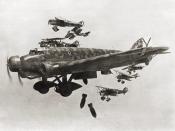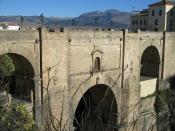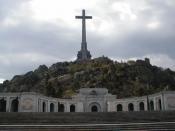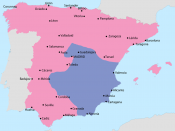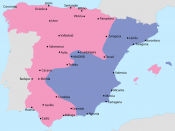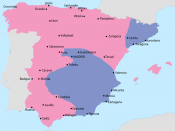How did the Spanish Civil War contribute to the policy of appeasement by Britain?Until 1931 Spain, the poorest country in Europe at the time, was a monarchy however, as a result of deep divisions within society exacerbated by the military rule of Primo de Rivera imposed in 1923, the incompetent King Alfonso XIII abdicated. Following municipal elections a liberal government took power but the ensuing republic was immediately at risk from the divide between the Nationalist right and the Republican left. As a result of divisions in political ideology many small parties arose which aligned into these left- and right-wing blocs. In the face of this clash tensions between the two steadily increased as the new, democratic, government set about reducing the power of the army through mass redundancy of officers and redistributing ownership of land to the Braceros as part of a range of, often unpopular, egalitarian policies. These changes polarised the population and between 1933 and 1936, after the election of a Nationalist government, political stability declined as alliances formed and collapsed whilst civil disturbances and rebellions tore the country apart.
As no one party was strong enough to take control each side was composed of a coalition, with the Republicans united to form the Popular Front comprised of democrats, socialists and communists, between whom there existed a stable balance of power, supported by anarchists . The joint seats of power for the Republicans were Madrid, Catalonia and the Basque region: both provinces were aspiring to autonomy with the blessing of the capital. Highly industrialised in comparison to the rest of Spain, modern ideals that were fostered from the principles of Marx found a natural home here; with the concept of democracy central to their cause the Republicans were representative of a movement sweeping through Europe which sought progress to create an equality that threatened the power of the elitist traditionalists that had been in place for centuries. Rejecting the role of both the Church and the army within the political sphere, the Republicans represented the poor and promoted a new morality which favoured the masses.
Set against this union was the Spanish Confederation of Autonomous Rights, a coalition of conservatives, monarchists, Catholics and Falangists (fascists), supported by the army and holding to the old values of autocracy, the 'natural superiority' of the wealthy and a strong central government. Much of Spain, predominantly the rural north and west, had not yet modernised creating a stronghold of nationalist sentiment grounded in traditional Catholic morality and conservatism. In an attempt to resolve the situation a further election was held in 1936, the leftist Popular Front won power but the attempt failed and the country disintegrated into chaos as both sides fought running battles in the streets. From the beginning of the civil war the army backed the Nationalists and in July 1936 General Francisco Franco returned from Spanish Morocco to lead a military coup against the government.
The division of Spain was representative of the greater power struggle being played out in Europe: Portugal, Italy and Germany (amongst others) were in the grip of Fascist totalitarianism and all three regimes actively supported the Nationalists, believing a strong, Fascist Spain could only help them in their causes. Meanwhile the Soviet Union, although also totalitarian, was under the control of Stalin's Communists, and therefore the ideological enemy of Europe as a whole, who supported their Republican comrades in Spain. However, the Soviets were the necessary ally of France and Britain in preventing the spread of Fascism and maintaining the balance of power in Europe, forcing them to act in unity. In this way the Spanish Civil War came to be considered an ideological war between Communism and Fascism and a dress-rehearsal for World War II by many historians.
Both Britain and France were in the grip of the economic slump created by the Depression and were unable to divert extra resources into rebuilding their military capabilities. In Britain Stanley Baldwin's National Government, controlled by the Conservative majority, also feared that should Hitler or Mussolini provide military aid Britain would be forced to act and the situation in Spain could easily escalate into another European war which Britain desperately wanted to avoid and was unprepared for. In addition to this the right-wing government was sympathetic to the Nationalists, despite their Fascist associations, due to their fear of a left-wing power bloc developing in Europe. Public sympathy lay with the Republic but this did not indicate a willingness to enter into another war so soon after the carnage of World War I. France, in contrast, was led by Blum's leftist Popular Front who were prepared to assist the Spanish government, initially agreeing to send aircraft and artillery. However, their dependence on the alliance with Britain combined with right-wing influence at home to force them to follow Britain's self-interested advice and instead jointly propose a multinational neutrality agreement.
In August 1936 the non-intervention pact was signed by 27 countries in the arms industry, including Germany, Italy, the Soviet Union and Portugal, preventing the sale of arms to either side and banning any intervention by foreign powers. This was an extremely unusual decision as the Popular Front were internationally recognised as the legitimate government with the right to self-defence and military provisioning and yet were being treated in the same way as the rebels by the international community. The U.S.A. did not sign the pact but agreed to abide by the policy after Congress passed an extension to the Neutrality act in 1937 prohibiting the sale of munitions to either side however, oil supplies were sent to aid Franco's Nationalists for the duration of the war. This was not the only occasion on which the agreement was ignored: only Britain remained entirely uninvolved, although the Foreign Enlistment act of 1870 was invoked on 9th January, 1937 to prevent British nationals from joining the conflict.
France also sent no aid but played host to the recruiting centre of the International Brigades: units fighting for the Republic formed by left-wing sympathisers from all over the world. Stalin felt that the existence of a fourth right-wing government seriously threatened the U.S.S.R. but was also wary of jeopardising his alliance with Britain and France, and so commissioned the Comintern to instigate the International Brigades. At the same time he sold the Republicans the vast majority of their military equipment whilst also sending an advisor, Alexander Orlov of the NKVD, to the Popular Front. Orlov was responsible for several assassinations and executions as well as political manoeuvring which led to the Spanish Communist Party becoming dominant within the Popular Front. This increased Britain's aversion to the Republicans but failed to entice the government into action: any intervention would break their 'neutrality' and force them into becoming actively involved in the conflict.
Throughout the course of the civil war Hitler, Mussolini and Antonio Salazar of Portugal gave direct aid to the Nationalists beginning with Mussolini providing aircraft and a cruiser to transport Franco's forces from Morocco to Spain. Italy's involvement deepened with the signing of a secret treaty, on 28th November 1936, securing military bases on Spanish territory in return for the provision of aircraft, munitions, artillery and vehicles along with more than 50,000 troops. Hitler, believing he ran the risk of angering the British, attempted to conceal his actions by sending aid through Portugal. However, after the lack of British and French response to the re-occupation of the Rhineland in March 1936 Hitler's confidence was growing and he felt safe sending men, planes, munitions and tanks to Franco. His confidence was proved well-founded when, once again, neither Britain or France challenged the Italian and German involvement, this encouraged the two countries to form the Rome / Berlin Axis on 1st November 1936 which led to the Pact of Steel in May 1939 and eventually the Tripartite agreement with Japan of 1940.
The most influential contribution made by the Nazis to the Spanish Civil War was the Condor Legion: an airborne unit under Franco's sole control with over 6,500 troops initially, the Legion would eventually have over 12,000 men divided between bomber, fighter, seaborne and reconnaissance groups. In 1935, Hitler broke another prohibition of the Versaille Treaty by commissioning the Luftwaffe however, he was net yet strong enough to risk testing his new force in Germany and so used Spain as a proving ground. The Condor Legion was involved in major engagements at Aragon, Brunete, Ebro and Teruel but the most notorious action they undertook was the bombing of Guernica: the spiritual home of the Basque region, Guernica possessed only two, relatively unimportant, military targets but on 26th April 1937 was subjected to a three-hour raid which all but destroyed the city and left over 1600 civilians dead and many more injured and homeless.
This marked the beginning of a new style of warfare which the Germans would later use against Britain. The aim of the raid was to create terror and break the spirit of the enemy as described by George Steer in The Times the following day, ÃÂThe object of the bombardment was seemingly the demoralization of the civil population and the destruction of the cradle of the Basque race.ÃÂ The action led to the belief that ÃÂthe bomber will always get throughÃÂ, a phrase used by Baldwin in a speech to parliament and a opinion which lent weight to the argument for appeasement: the British Government knew they did not possess the capability to counter such an attack and feared the results should they challenge Hitler.
By the end of the Spanish Civil War Europe itself was on the brink of war but Britain maintained the policy of appeasement under Chamberlain until March 1939 when Hitler broke the Munich agreement by invading Czechoslovakia. In the wider context of Europe in the build-up to war the Spanish Civil War played a significant role in exposing the weakness of the British and French governments in opposing Hitler's and Mussolini's growth in power as well as their unwillingness to control the Soviets. All three totalitarian governments now viewed the Allies as being easily threatened and unlikely to challenge any further infringements of the existing treaties. As such, Hitler felt safe in annexing Austria and continuing the expansion of his forces, whilst Stalin continued to act independently as he felt necessary. At the same time, the British and French populations' fear of the bomber only served to increase the anti-war sentiment brought about by the First World War and the subsequent desire to avoid another war at all costs.
It was this Pacifism which formed the basis of the policy of appeasement: given the unparalleled loss of life that took place between 1914 and 1918 the British public dreaded a repeat and were made all the more fearful after Guernica. The National Government was already struggling to run a country that had fallen far and hard from the Imperial might of the early 20th century and could not risk losing the support of the people, therefore it was necessary to follow this policy despite the suspicions of many, such as Churchill and Eden, about the Fascists' plans. This, combined with the Government's anti-left sentiment, was enough to justify inaction in Spain but other issues helped to further vindicate Chamberlain's position.
Part of Britain's downfall in the early 1900's was due to the Depression which had severely damaged many powerful nations and it was this relative poverty which forced the British government to both stay out of the Spanish Civil War and accept Hitler's flagrant breaches of the Treaty of Versaille and the non-intervention pact. As a result of the lack of investment in the military brought about by Britain's poverty the government believed the army to small to effectively take on Hitler, even indirectly in Spain, believing Germany too strong to safely oppose. However, by allowing Hitler to aid the Spanish unchallenged Chamberlain effectively lost another psychological battle and gave Hitler more time to re-arm in preparation for the conflict he fully expected.
Word Count2004BibliographyBowen, W.H. Spain During World War II, 2006, University of Missouri Press, Columbia.
Olsen, J.S. Historical Dictionary of the Great Depression, 1929 ÃÂ 1940, 2001, Greenwood Publishing Group, New York.
Simkin, J. Spartacus Educational: The Spanish Civil War, 1997, Open University Press, London.
